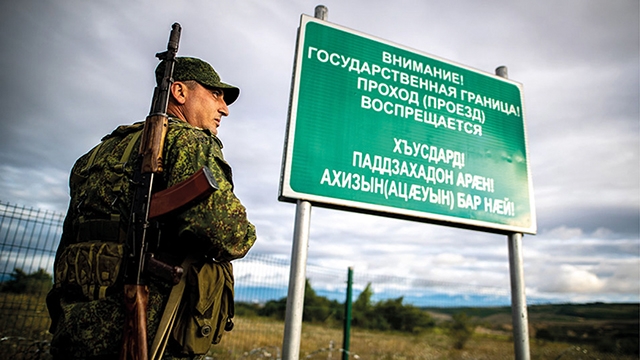The Breakaways Vs COVID-19
COVID-19, the virus discovered in the Chinese province of Wuhan, is already ruling the planet. The epidemic that started last December has reached the state of pandemic after just three months and spread over the five continents. Despite the horrendous march of the virus, the leaders of the occupied Georgian territories don’t believe it will reach Abkhazia or South Ossetia, as if Sokhumi and Tskhinvali, by closing the administrative borders with the rest of Georgia, will be able to defeat the deadly virus and Russia will be the one helping with their healthcare.
The Enguri bridge has been closed since February 14. The Georgian population from Gali living by the bridge are officially prohibited from travelling to the territories controlled by Official Tbilisi. The situation by the Russian border is softer, with those holding Russian passports are allowed to enter. North Korean workers are banned from travelling through the Psou border, as are the Kirgiz, Uzbek and Tajiks, who were hired by Russian businesses to work on constructions in Sokhumi. These were the changes and measures for the new border regime that the de-facto acting President Valeri Bganba informed the Kremlin representative Aleksey Dvinianin about.
After the virus did “attack” Russia and the Kremlin began the emergency construction of a new Infectious Disease Hospital near Moscow, Sokhumi finally admitted the simple truth that the virus can be contracted equally by Georgians, French, Italians or Russians. Hence, on March 21, they decided to start testing the population for the virus, provided the Kremlin keeps its word and sends tests to them, having refused to accept the tests or artificial ventilation systems offered by Tbilisi. At a time when numerous hospitals from Rome and Milan to Brussels or Amsterdam have been left powerless against the virus, it is difficult to believe in the readiness of Sokhumi Infectious Disease Hospital or Anti-tuberculosis hospitals in Gulripshi, which is where the occupational regime plans to hospitalize patients. Currently, the tests are sent to Krasnodar and the results need a few days to be worked on. The first humanitarian aid from Moscow arrived on March 14, bringing the safety equipment for doctors in Abkhazia. However, there’s no trace of the promised tests or medicine. The last known data suggests that there are about 245 thousand people residing in the occupied territories, and if the existing statistics of the spread of the virus don’t adjust to the Abkhazian forecasts, we will soon see cases emerging there.
The same story goes for occupied South Ossetia, where antiviral events develop according to the Abkhazian scenario. Like Sokhumi, the Tskhinvali regime was quick to close the administrative borders with the rest of Georgia, saying the reason was the flow of Georgians from Tbilisi fleeing the virus. Tskhinvali is confident that the main source of the spread will be connected with Georgia rather than Russia, and they too have refused to accept medical aid from Tbilisi. The officials believe that Russia will be the solid guarantee for their citizens and have closed educational institutions until May 1.
Despite the similarities, at these sad times the occupied territories have different things to hope for, and while Sokhumi is waiting for the tests from Moscow, Tskhinvali is waiting for the abolition of the border regime, which started from January 1st at the Roki border checkpoint. The novel border legislation of Russia requires special documents for any transport vehicle that is not registered in one of the Eurasian Council countries and makes its cargo subject to customs clearance. And instead of seeking support to fight coronavirus, the de-facto President Bibilov met Putin last week to discuss these issues.
Tkhinvali is also waiting for tests from Russia, and the last information suggested they should arrive this week from Vladikavkaz. Most likely, the infectious patients will also be transported to Vladikavkaz, since there are no isolation units or relevant medical equipment in Tskhinvali. The weather forecast for Roki tunnel suggests a higher probability for the need to transport these patients to Tbilisi. Before that, the only safety measure to fight the virus is quarantine, where they have 5 people, of which 4 were in Tbilisi, and 1 in the UAE. Fortunately, for now, only the next round of Geneva discussions has succumbed to COVID-19 and the Tskhinvalian officials won’t be able to travel to Geneva on April 31-1, the only place where they can travel officially apart from Moscow. Most importantly, nobody knows how long they’ll need to wait until they can.
By Zaza Jgarkava
Image source: Sergei Bobylev / TASS












